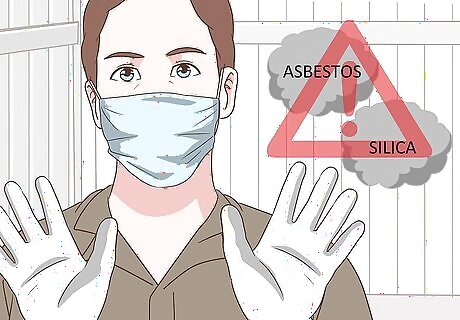
views
Eliminating Risk Factors

Quit smoking to reduce your risk of developing a disease. Smoking can greatly increase your risk of developing an autoimmune disease like rheumatoid arthritis. If you are a smoker, ask your doctor about the best way for you to quit. They may recommend: Nicotine replacement therapy, which may come in the form of gum, patches, inhalers, sprays, or lozenges. Prescription medication to help with withdrawals, such as Zyban or Chantix. Behavioural therapy, where a counselor will help you find strategies to stop smoking.

Avoid exposure to environmental pollutants that may cause you harm. The development of autoimmune conditions like rheumatoid arthritis can be linked to environmental pollutants, particularly asbestos and silica. Always wear protective equipment like a mask and gloves while working with harsh chemicals. Whenever possible, avoid construction sites or other areas where you may be exposed to asbestos, silica, or other possible contaminants. Harsh chemicals may include pesticides or strong solvents like paint thinner.

Try a gluten-free diet if you show signs of a gluten intolerance. Celiac disease is an autoimmune condition where the body's immune system attacks the small intestine as a reaction to gluten. The development of the disease may be attributed to the consumption of gluten despite an intolerance for it. If you suspect you have a gluten intolerance, try removing it from your diet by avoiding wheat products, reading product labels carefully, and shopping for gluten-free food items. Celiac disease can cause fatigue and chronic diarrhea. A gluten intolerance may results in symptoms like tiredness and stomachaches.
Improving Your Health

Lose weight if you are overweight to help prevent autoimmune disease. Being overweight or obese is associated with a higher chance of developing autoimmune disease like type 1 diabetes and rheumatoid arthritis. Ask your doctor about the best way to lose weight safely and effectively. Eat healthy, nutritious foods and start a regular exercise program to control or reduce your weight. Do at least 30 minutes of moderate exercise, 3 or more times a week. Moderate exercise could include walking, jogging, riding a bicycle, rollerblading, or swimming. Avoid processed, fatty, or sugary foods that are associated with unhealthy weight gain.

Increase your vitamin D intake through moderate sun intake and diet. A vitamin D deficiency can increase your risk of autoimmune diseases like rheumatoid arthritis and type 1 diabetes. Get more vitamin D by getting 5-10 minutes of moderate sun exposure 2-3 times a week. To add more vitamin D to your diet, eat fatty fish like salmon, tuna, and mackerel once or twice a week. Vitamin D can also be found in fish liver oils. Ask your doctor if vitamin D supplements would be right for you.

Take action to relieve stress. Stress can wreak havoc on your immune system and make you vulnerable to autoimmune diseases such as lupus. Avoid undue stressors and take the time to do things that make you feel less anxious. If your stress feels overwhelming, discuss it with your doctor and look into counselling or therapy to help you feel more balanced. Activities like writing in a journal, doing yoga, cooking, jogging, or dancing may help you feel more relaxed.

Visit your doctor regularly to diagnose of any autoimmune diseases. Early detection and treatment is your best bet at slowing and managing an autoimmune disease. Visit your doctor at least once a year for a full check up. If you have any concerns about you health, contact them immediately. Your doctor will give you a full examination and run blood tests or whatever else is necessary to identify autoimmune conditions.




















Comments
0 comment